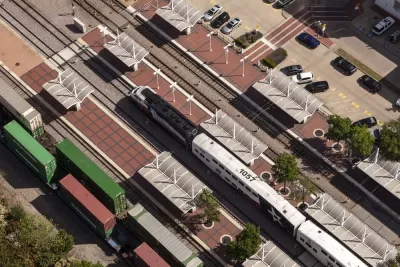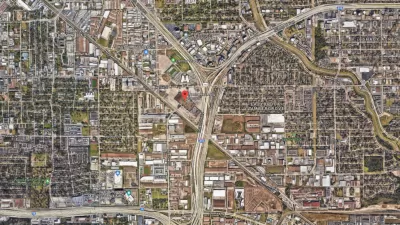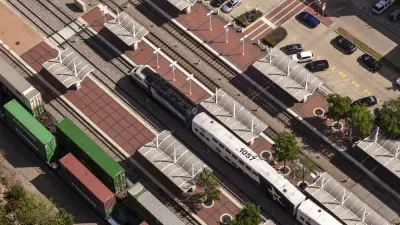The California high-speed rail project is not alone in confronting legal and political obstacles. The main issue in Texas that has aroused opposition to the privately financed, 240-mile Dallas to Houston bullet train is the use of eminent domain.

Ten Texas legislators filed more than 20 bills last week to stop Texas Central's high-speed rail project that will take only 90 minutes to go from Dallas to Houston, traveling at speeds up to 205 miles per hour. Brandon Formby, urban affairs reporter for The Texas Tribune, reports on the main issue behind the flurry of bills: whether Texas Central has the legal ability to expropriate private property for public use, with payment to property owners.
[P]roject opponents cite [a] provision of the transportation code that defines a railroad with such power as a company “operating” a line. Since Texas Central’s bullet train isn’t yet up and running, they argue the company and its subsidiaries can’t possibly be considered a railroad since the word “operating” is written in present tense.
State Rep. John Wray of Waxahachie authored six of the bills filed this week, including one that would strip any entity operating a train going faster than 120 mph from using eminent domain.
Texas Central Partners, LLC (Texas Central), the private company building the project, shrugs off the charges that it is not a railroad and therefore lacks the ability to utilize eminent domain. Furthermore, they hope that they can secure agreements by negotiating with land owners without resorting to the controversial process.
Jill Cowan, economics news reporter for Dallas News, reported that Texas Central Partners on Feb. 7 dropped "more than a dozen lawsuits against landowners who refused to allow the company on their property to survey." By doing so, it hopes "to negotiate with landowners more amicably
"Earlier this month, Texas Central announced about 30 percent of the parcels needed for the 240-mile project are covered under sale option agreements, meaning landowners have agreed to sell the land once the project has the necessary environmental clearances and is ready for construction," reports Dug Begley of the Houston Chronicle.
The nation's 'other' high-speed rail project, now under construction for two years, has also been delayed by land acquisition issues in California's Central Valley. Tim Sheehan reported in April 2015 for the Fresno Bee on 50 eminent domain lawsuits filed in Fresno County against the California High-Speed Rail Authority and on a bill proposed to curb the use of eminent domain by the rail authority.
Most high-speed rail litigation in California has involved the California Environmental Quality Act, unique to the Golden State, and issues pertaining to the Proposition 1A, the 2008, $9.95 billion general obligation bond measure that authorized the project.
While Republicans have introduced state legislation to challenge high-speed rail, their minority status and Democratic Gov. Jerry Brown's strong support for the project make their efforts difficult, but not so on a federal level.
Last month the state's GOP congressional delegation sent the Federal Transit Administration a letter asking they delay a vital decision on a $647 million grant to electrify the Caltrain commuter rail corridor between San Jose and San Francisco only because the tracks would be shared with high-speed rail. The FTA agreed, and now both projects are jeopardized.
FULL STORY: "Come and take it": Eminent domain dispute at heart of bullet train battles

Alabama: Trump Terminates Settlements for Black Communities Harmed By Raw Sewage
Trump deemed the landmark civil rights agreement “illegal DEI and environmental justice policy.”

Study: Maui’s Plan to Convert Vacation Rentals to Long-Term Housing Could Cause Nearly $1 Billion Economic Loss
The plan would reduce visitor accommodation by 25% resulting in 1,900 jobs lost.

Planetizen Federal Action Tracker
A weekly monitor of how Trump’s orders and actions are impacting planners and planning in America.

Wind Energy on the Rise Despite Federal Policy Reversal
The Trump administration is revoking federal support for renewable energy, but demand for new projects continues unabated.

Passengers Flock to Caltrain After Electrification
The new electric trains are running faster and more reliably, leading to strong ridership growth on the Bay Area rail system.

Texas Churches Rally Behind ‘Yes in God’s Back Yard’ Legislation
Religious leaders want the state to reduce zoning regulations to streamline leasing church-owned land to housing developers.
Urban Design for Planners 1: Software Tools
This six-course series explores essential urban design concepts using open source software and equips planners with the tools they need to participate fully in the urban design process.
Planning for Universal Design
Learn the tools for implementing Universal Design in planning regulations.
Caltrans
Smith Gee Studio
Institute for Housing and Urban Development Studies (IHS)
City of Grandview
Harvard GSD Executive Education
Toledo-Lucas County Plan Commissions
Salt Lake City
NYU Wagner Graduate School of Public Service




























